unit 1 Introduction 英语词汇学教程
- 格式:ppt
- 大小:389.50 KB
- 文档页数:39

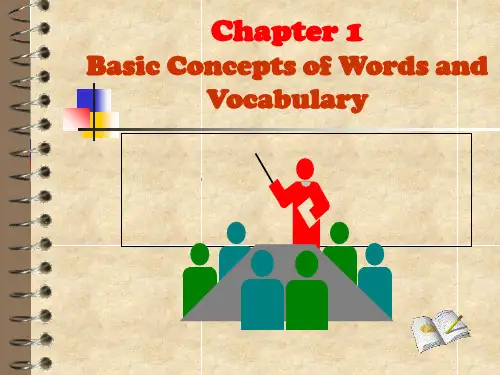
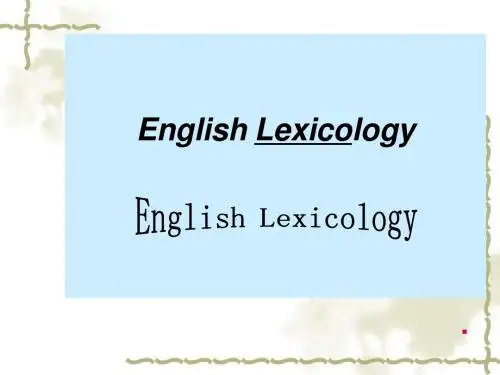
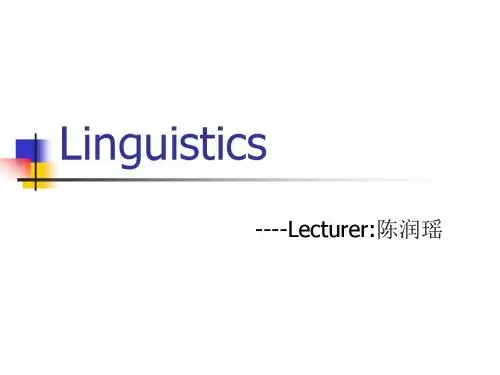
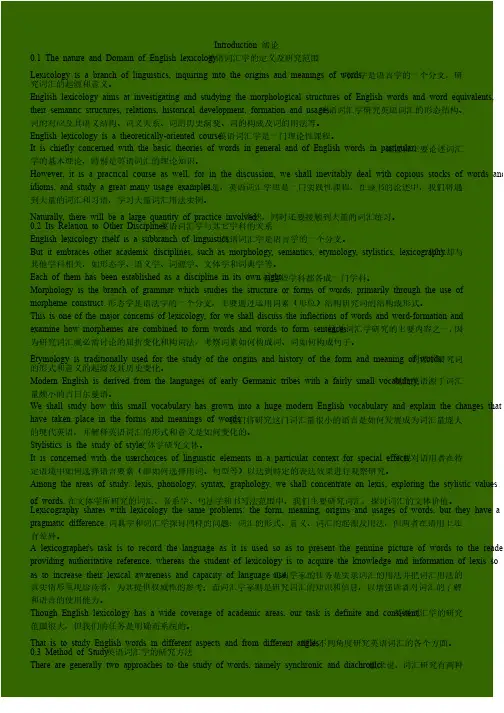
Introduction 绪论0.1 The nature and Domain of English lexicology 英语词汇学的定义及研究范围Lexicology is a branch of linguistics, inquiring into the origins and meanings of words. 词汇学是语言学的一个分支,研究词汇的起源和意义。
English lexicology aims at investigating and studying the morphological structures of English words and word equivalents, their semantic structures, relations, historical development, formation and usages. 英语词汇学研究英语词汇的形态结构、词的对应及其语义结构、词义关系、词的历史演变、词的构成及词的用法等。
English lexicology is a theoretically-oriented course. 英语词汇学是一门理论性课程。
It is chiefly concerned with the basic theories of words in general and of English words in particular. 该课程主要论述词汇学的基本理论,特别是英语词汇的理论知识。
However, it is a practical course as well, for in the discussion, we shall inevitably deal with copious stocks of words and idioms, and study a great many usage examples. 但是,英语词汇学也是一门实践性课程,在该书的论述中,我们将遇到大量的词汇和习语,学习大量词汇用法实例。
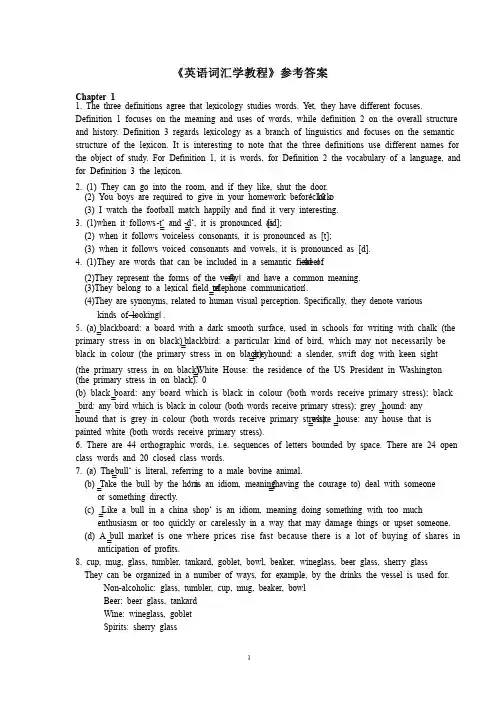
《英语词汇学教程》参考答案Chapter 1 1. 1. The The three three definitions definitions agree agree that that lexicology lexicology studies studies words. words. Y et, Y et, they they have have different different focuses. focuses. Definition 1 focuses on the meaning and uses of words, while definition 2 on the overall structure and history. Definition 3 regards lexicology as a branch of linguistics and focuses on the semantic structure of the lexicon. It is interesting to note that the three definitions use different names for the object of study. For Definition 1, it is words, for Definition 2 the vocabulary of a language, and for Definition 3 the lexicon. 2. (1) They can go into the room, and if they like, shut the door. (2) You boys are required to give in your homework before 10 o ‘clock. (3) I watch the football match happily and find it very interesting. 3. (1) w hen it follows ‗when it follows ‗-t‘ and ‗-d‘, it is pronounced as [id]; (2) when it follows voiceless consonants, it is pronounced as [t]; (3) when it follows voiced consonants and vowels, it is pronounced as [d]. 4. (1)They are words that can be included in a semantic field of ―tree treeǁǁ. (2)They represent the forms of the verb ―fly flyǁǁ and have a common meaning. (3)They belong to a lexical field of ‗telephone communication ‘. (4)They (4)They are are synonyms, synonyms, related related to to human human visual visual perception. perception. Specifically, Specifically, they they denote denote various various kinds of ―looking lookingǁǁ. 5. (a) ‗blackboard: a board with a dark smooth surface, used in schools for writing with chalk (the primary stress in on black) ; ‗blackbird: a particular kind of bird, which may not necessarily be black in colour (the primary stress in on black); ‗greyhound: a slender, swift dog with keen sight (the primary stress in on black), ‗White House: the residence of the US President in Washington (the primary stress in on black). 0 (b) black ‗board: any board which is black in colour (both words receive primary stress); black ‗bird: bird: any any bird bird which which is is black black in in colour colour (both (both words words receive receive primary primary stress); stress); grey grey ‗‗hound: hound: any any hound that is grey in colour (both words receive primary stress); ‗white ‗house: any house that is painted white (both words receive primary stress). 6. There are 44 orthographic words, i.e. sequences of letters bounded by space. There are 24 open class words and 20 closed class words. 7. (a) The ‗bull bull‘‘ is literal, referring to a male bovine animal. (b) ‗Take the bull by the horn ‘ is an idiom, meaning ‗(having the courage to) deal with someone or something directly. (c) (c) ‗‗Like Like a a bull bull in in a a china china shop shop‘‘ is is an an idiom, idiom, meaning meaning doing doing something something with with too too much much enthusiasm or too quickly or carelessly in a way that may damage things or upset someone. (d) A ‗bull market ‘ is one where prices rise fast because there is a lot of buying of shares in anticipation of profits. 8. cup, mug, glass, tumbler, tankard, goblet, bowl, beaker, wineglass, beer glass, sherry glass They can be organized in a number of ways, for example, by the drinks the vessel is used for. Non-alcoholic: glass, tumbler, cup, mug, beaker, bowl Beer: beer glass, tankard Wine: wineglass, goblet Spirits: sherry glass Chapter 2 1. Lexeme is an abstract linguistic unit with different variants, for example, sing as against sang, sung. Morpheme is the ultimate grammatical constituent, the smallest meaningful unit of language. For example, m oralizers moralizers is an English word composed of four morphemes: moral +lize +er +s . Any concrete realization of a morpheme in a given utterance is called a morph, such as cat, chair , -ing, -s , etc. , etc. Allomorphs are the alternate phonetic forms of the same morpheme, for example, [t], [d] and [id] are allomorphs of the past tense morpheme in English. 2. quick-ly, down-stair-s, four-th, poison-ous, weak-en, world-wide, inter-nation-al-ly, in-ject, pro-trude 3. island, surname, disclose, duckling, cranberry, reading, poets, flavourfulness, famous, subvert 4. (a) [ ə] (b)[ -ai] 5. (1) –‗–‗s, -s (2) -est, -s (3) –ing (4) –ed 6. The connotations are as follows: (1) slang, carrying the connotation of reluctance, (2)informal, carrying the connotation that the speaker speaker is is speaking speaking to to a a child, child, (3) (3) beastie beastie is is used used to to a a small small animal animal in in Scotland, Scotland, carrying carrying the the connotation of disgust, (4) carrying the connotation of formalness, (5) carrying the connotation of light-heartedness. 7. { -əm; ~- n; ~- n; ~-i: ~-s; ~-z; ~-iz} 8. court: polysemy dart: polysemy fleet: homonymy jam: homonymy pad: homonymy steep: homonymy stem: homonymy stuff: polysemy watch: polysemy 9. (1)(1)——(f), (2)(2)——(g), (3)(3)——(c), (4)(4)——(e), (5)(5)——(a), (6)(6)——(d), (7)(7)——(b) 10.(1) unpractical (2) break (3) impractical (4) rout (5) pedals (6) Route(7) raze Chapter 3 1. The history of English can be divided into four periods: the Old, Middle, Early middle and Modern English periods. In Old English period, there is a frequent use of coinages known as ‗kennings kennings‘‘, which refers to to vivid vivid figurative figurative descriptions descriptions often often involving involving compounds. compounds. The The absence absence of of a a wide-ranging wide-ranging vocabulary vocabulary of of loanwords loanwords force force people people to to rely rely more more on on word-formation word-formation processes processes based based on on native elements. The latter period of Old English was characterized by the introduction of a number number of of ‗‗loan loan translations translations‘‘. . Grammatical Grammatical relationships relationships in in Old Old English English were were expressed expressed by by the use of inflectional endings. And Old English is believed to contain about 24,000 different lexical items. In In Middle Middle English English period, period, English English grammar grammar and and vocabulary vocabulary changed changed greatly. greatly. In In grammar, grammar, English English changed changed from from a a highly highly inflected inflected language language to to an an analytic analytic language. language. In In vocabulary vocabulary English was characterized by the loss of a large part of the Old English word-stock and the addition of thousands of words from French and Latin. In In Early Early Modern Modern English English period, period, English English vocabulary vocabulary grew grew very very fast fast through through extensive extensive borrowing and expansion of word-formation patterns. And there were a great many semantic changes, as old words acquire new meanings. Modern Modern English English is is characterized characterized with with three three main main features features of of unprecedented unprecedented growth growth of of scientific vocabulary, the assertion of American English as a dominant variety of the language, and the emergence of other varieties known as ‗New Englishes ‘. 2. appeareth appeareth in in (a) (a) becomes becomes appeared appeared in in (b), (b), and and dreame dreame becomes becomes dream. dream. The The passive passive were were departed departed becomes becomes the the active active had had gone. gone. With With the the change change of of word word forms, forms, (b) (b) looks looks simple simple morphologically. 3. barf: American slang kerchief: French mutton: French cadaver: Latin goober: Kongo leviathan: Latin ginseng: Chinese taffy: North American kimono: Japanese whisky: Irish caddy: Malay sphere: Latin algebra: Arabic giraffe: African 4. train: train: meaning meaning changed changed from from the the trailing trailing part part of of a a gown gown to to a a wide wide range range of of extended extended meanings. deer: meaning narrowed from ‗beast ‘ or ‗animal ‘ to ‗a particular kind of animal ‘knight: meaning ameliorated from ‗boy, manservant ’ to ‗a man in the UK who has been given an honor of knighthood ‘meat: meaning narrowed down from ‗food ‘ to ‗the edible flesh of animals and the edible part of fruit ‘. hose: meaning extended from ‗leg covering ‘ to ‗a long tube for carrying water ‘. 5. sell: specialized hound: specialized starve: specialized wife: specialized loaf: specialized 6. American English British English Fall Autumn candy sweet corn Maize semester term apartment flat Dresser Dressing table Street car Tram car Chapter 4 1. read+-i+-ness dis-+courage+-ing kind+heart+-ed un-+doubt+-ed+-ly stock+room+-s pre-+pack+-age+-ed 2. book: books(n.); books(v.), booking, booked forget: forgets, forgot, forgotten short: shortter, shortest snap: snaps, snapping, snapped take: takes, taking, took, taken goose: geese heavy: heavier, heaviest 3. –ish: meaning ‗having the nature of , like ‘de-: meaning ‗the opposite of ‘-ify: meaning ‗make, become ‘-dom: means ‗the state of ‘il-(im-/in-): meaning ‗the opposite of, not ‘-able: meaning ‗that can or must be ‘ mis-: meaning ‗wrongly or badly ‘-sion(-tion):meaning ‗the state/process of ‘pre-: meaning ‗prior to ‘-ment: meaning ‗the action of ‘re-: meaning ‗again again‘‘under-: meaning ‗not enough ‘-al: meaning ‗the process or state of ‘4. a. They are endocentric compounds. They have the ―Adj + N ǁ structure, in which adjectives are are used used to to modify modify nouns nouns ‗‗line, line, line, line, neck, neck, room room‘‘. . Hotline Hotline means means ‗‗a telephone telephone number number that that people people can can call call for for information information‘‘. . Mainline Mainline means means ‗‗an an important important railway railway line line between between two two cities cities‘‘. Redneck means ‗a person from the southern US ‘. Darkroom means ‗a room with very little in it, used for developing photographs ‘. b. b. They They are are endocentric endocentric compounds. compounds. They They have have the the ――N N + + N ‘ structure. structure. Bookshelf Bookshelf means means ‗‗a shelf for keeping books ‘. Breadbasket means ‗a container for serving bread ‘. Mailbox means ‗a a box box for for putting putting letters letters in in when when they they delivered delivered to to a a house house‘‘. . Wineglass Wineglass means means ‗‗a a glass glass for for drinking wine ‘. c. They are endocentric compounds. They have the ―N + N ‘ structure. Letterhead means ‗the head of a letter (i.e. the name and address of an organization printed at the top of a letter)‘. Roadside means ‗the area at the side of a road ‘. Keyhole means ‗the hole in a lock for putting the key in ‘. Hilltop means ‗the top of a hill ‘. d. They are exocentric compounds. Dropout means ‗a person who leaves school before they have finished their studies. Go-between means ‗a person who takes messages between people ‘. Turnout means ‗the number of people who come to an event event‘‘. Standby means ‗a person or thing that can always be used if needed ‘. e. e. They They are are endocentric endocentric compounds. compounds. They They have have the the ――Adj Adj + + N-ed N-edǁǁ structure, structure, in in which which adjectives are used to modify the N-ed. f. They are endocentric compounds. They have the ―N + Adj ǁ structure, meaning As Adj As N. 5. in-: not, the opposite of en-: to put into the condition of dis-: not, the opposite of un-: not, the opposite of inter-: between, among mis-: wrongly or badly over-: too much re-: again post-: after 6. a. a young dog; piglet b. a female editor; hostess c. a place for booking tickets; refinery d. one who is kicked; trainee e. the state of being put up; output 7. unbelievable: un- (prefix), -able (suffix) inexhaustible: in- (prefix), -ible(suffix) multinational: multi (prefix)-, -al(suffix) teleshopping: tele- (prefix), -ing (suffix) 8. a. Initialism b. Blending c. Compounding d. conversion 9. a. compounding, affixation b. compounding, affixation c. compounding, shortening d. compounding, affixation 10. a. consumable, comprehensible, exchangeable, permissible b. absorbent, assistant, different, participant c. constructor, liar, beggar, editor, developer d. elementary, stationary, brewery, mockery Chapter 5 1. (a) connotation (b) formality (c) dialect (d) connotation 2. water rainwater, brine, tap water, mineral water, spring water, purified water, aerated water, ………….. .. 3. (a) keeping (b) feeling of admiration or respect 4. (a) hyponymy (b) meronymy 5. (a) light beer, strong beer (b) heavy coffee, strong coffee, weak coffee 6. amateur —dabbler, funny funny——ridiculous, occupation occupation——profession, small small——little, famous famous——renowned, fiction fiction——fable, smell smell——scent 7. These words refer to different kinds of pictures or diagrams. Drawing: picture or diagram made with a pen, pencil, or crayon. Cartoon refers to ‗an amusing drawing in a newspaper or magazine ‘. Diagram Diagram refers refers to to a a simple simple drawing drawing using using lines lines to to explain explain where where something something is, is, how how something something works, etc. Illustration refers to a drawing or picture in a book, magazine etc. to explain something. Sketch refers to a simple picture that is drawn quickly and does not have many details. 8.(a) gradable (b) non-gradable, reversive (c) gradable (d) non-gradable, reversive (e) gradable (f) non-gradable 9.(a) antonym (b) hyponymy (c) antonym (d) synonymy (e) meronymy Chapter 6 1. 1) literal expression 2) idiom 3) literal expression 4) idiom 5) idiom 6) literal expression 2. 1) die 2) something that makes a place less attractive 3) suddenly realize or understand something 4) make one‘s friends disappoint 5) continue to argue something that has already been decided and is not important 6) react quickly so as to get an advantage 3. 1) gradually reduce the amount of time, money, etc. 2) give support and encouragement to someone in a game, competition, etc 3) give something to the person it belongs to 4) annoy 5) fail because a part is weak or incorrect 6) try to find out the facts about something 7) live under the rule of someone 8) talk to someone in order to find out his opinions, ideas, feelings etc. 9) give someone a warning or secret information about something Chapter 7 1.General dictionaries include all of the elements of a lexicon, including meanings, pronunciations, usages, and histories of the words of their language. Specialized dictionaries are restricted to one variety or to one type of entryword. 2.They are different in that different media are used. Print dictionaries do not use electric power and can be used in all kinds of light. Electronic dictionaries are easy to carry. . 3.Open to discussion. 4.Open to discussion. 5.(a) symbolise is a person, an object, an event, etc. that represents a more general quality or (b) symbol of sth is a person, an object, an event, etc. that represents a more general quality or is a sign, number, letter, etc. that has a fixed meaning, especially in situation; symbol for sth is a sign, number, letter, etc. that has a fixed meaning, especially in science, mathematics and music (a)/sim/sim‘‘bɔlik/ and /sim‘ba:lik/ (b)represent (c)2 (d)Yes. We know that form the label [VN] and the examples. Chapter 8 1.vertically challenged—short sanitation engineer—garbage collector women‘‘s toilet ladies‘‘ cloak room—womenethnic cleansing--genocide ladies2.(1)They differ in connotation. Politician implies disapproval while statesman implies approval. (2)They differ in connotation. Inexpensive sounds indirect. implies approval. (3) They differ in connotation. flatter implies disapproval, while praise i mplies approval. scholar is neutral. (4) They differ in connotation. pedant implies disapproval, s cholar3.(1) buttocks — buns (2) nonsense — bullshit (3) prison — can (4) cocaine — coke 4.(a).Turn off the lights, please.(b) Would you please turn off the lights? 5. Answers vary from person to person. 6. (1) on a formal occasion. (2) when the speaker is seeing a friend off (3) when the speaker is angry and wants the addressee to leave (4) when the speaker is talking with a close friend. 7. gateway, firewall, virus, bookmark, address, DOS, cyberspace, profiler, browser, login 8. They differ in the terms they used, as they are different jargons. Chapter 9 1. knife: an object with a sharp blade for cutting things clothes: things we wear to keep our bodies warm; building: a structure made of a strong material, having roof, walls, windows, and doors 2. She attacked every weak point in my argument. He withdrew his offensive remarks. I hit back at his criticism. She produced several illustrations to buttress her argument. I braced myself for the onslaught. 3. The suffix–ee is typically attached to a verb meaning ‗one who is the object of the verb ‘. This meaning meaning is is considered considered as as the the core core meaning meaning of of the the form. form. So, So, trainee means means ‗‗one one who who is is being being trained ‘. But the background knowledge associated with the verb may modulate the meaning of the suffix. Suffix –ee in standee moves away from the core meaning and is deprived of the ‗object ‘ meaning. So ‗standee ‘ means ‗one who stands ‘. 4. 4. In In ‗‗good good baby baby ‘, , ‗‗good ‘ means means ‗‗well-behaved, well-behaved, not not causing causing trouble trouble ‘; ; in in ‗‗good good parent parent ‘, , ‗‗good ‘ means ‗kind, generous, considerate, etc .‘5. (1) is used to show sad feelings while (2) is used as an apology. 。
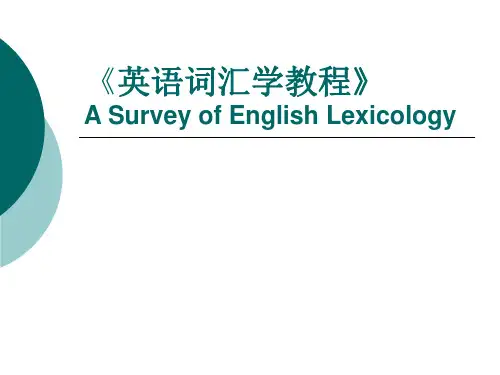
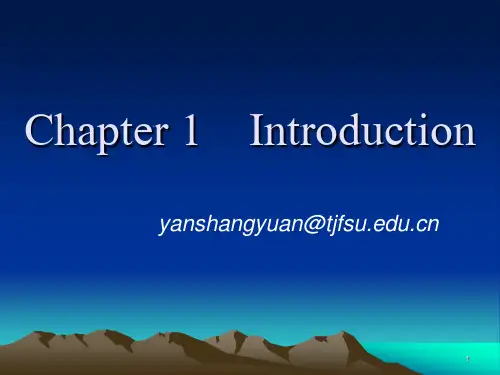


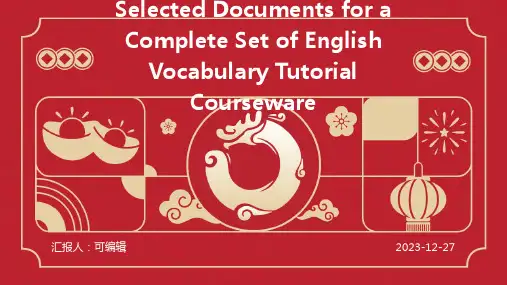
第一课时Introduction介绍Teaching aim: Give you a general concept of Lexicology 对词汇学有个整体概念上的把握Teaching plan:0.1 the nature and domain of English Lexicology 词汇学的性质和范畴The definition of English Lexicology: It is a branch of linguistics, inquiring into the origins and meanings of words.英语词汇学定义:它是语言学的分支,主要研究单词的起源和意义。
The Nature and Scope of English lexicology:English lexicology aims at investigating and studying the morphological structures of English words and word equivalents, their semantic structures, relations, historical development, formation and usages.词汇学的性质和范畴:英语词汇学主要意在调查和研究单词和对等次的形态结构,比如语义结构,语义关系,历史发展,构成和用法。
0.2 Its Relation to Other Discipline 词汇学与其它规则之间的关系The subjects that English Lexicology correlated with :English Lexicology is correlated with such linguistic disciplines as morphology(形态学), semantics(语义学),etymology(词源学),stylistics(文体学)and lexicography(词典学)与英语词汇学有关的课题:形态学、语义学、词源学、文体学、词典学Morphology is the branch of grammar which studies the structure or forms of words,primarily through the use of morpheme construct.形态学是语言学的分支,主要说明如果通过词素构造来研究单词形式或结构的。